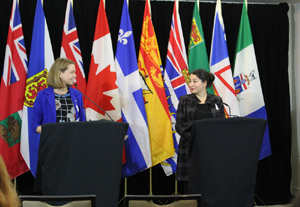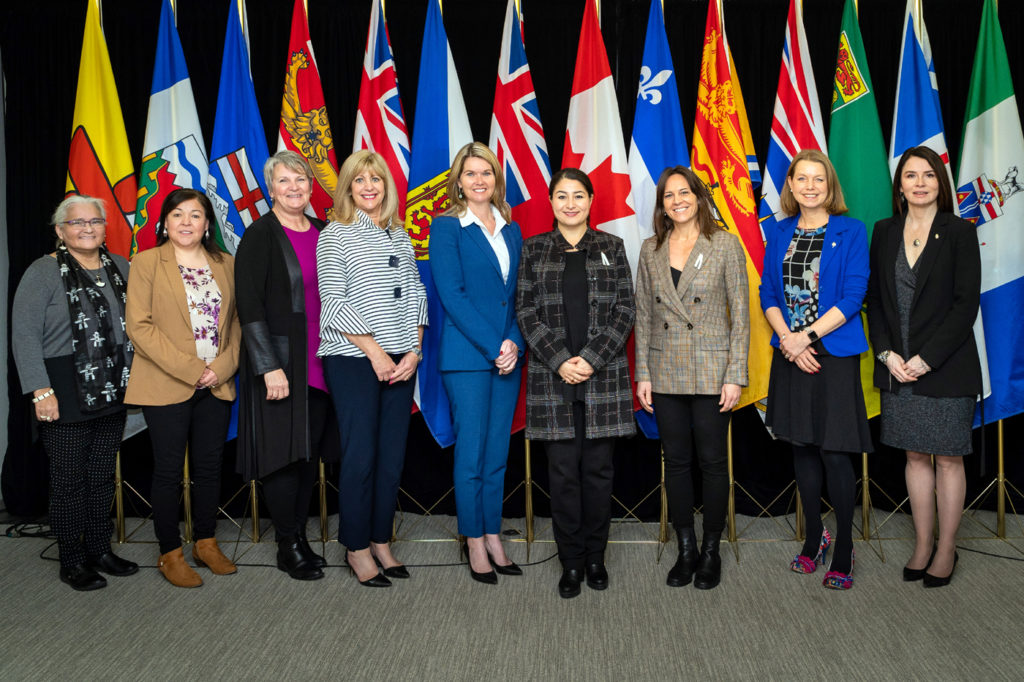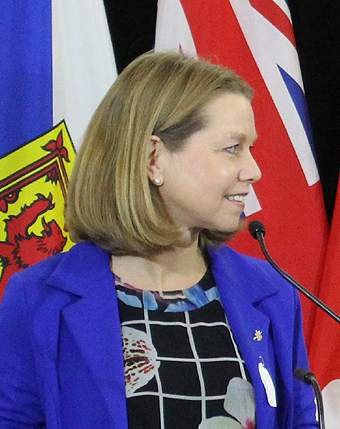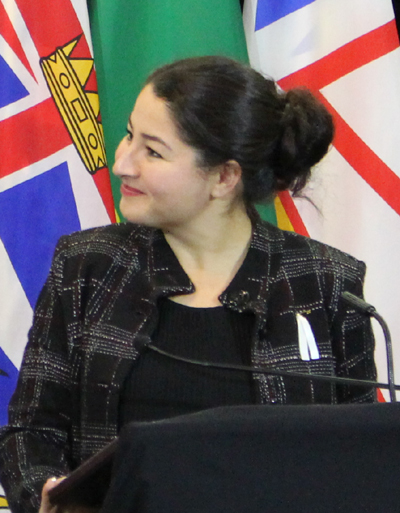
Sunday December 8, 2019 ~ VICTORIA
by Mary P Brooke ~ West Shore Voice News
On Wednesday December 4 in Victoria a group elected leaders wrapped up their three-day meeting to advance gender equity in the everyday lives of Canadians.
The 37th annual meeting of Federal-Provincial-Territorial (FPT) Ministers Responsible for the Status of Women met to discuss the many issues of importance for achieving gender equality, including: women’s economic empowerment and leadership, gender-based violence (including cyber-violence, human trafficking, domestic violence), the safety of indigenous women and girls, and issues facing LGBTQ2S communities.
BC’s Parliamentary Secretary for Gender Equity Mitzi Dean together with federal Minister for Women and Gender Equality and Rural Economic Development Maryam Monsef were co-chairs for the meeting. They hosted a media conference on December 4 at which they remarked on how productive the discussions have been.

Hosting the event at the Delta Ocean Pointe Hotel, Parliamentary Secretary Dean summarized the work of the meetings as being about removing barriers toward making things better for women, girls and those who are gender diverse. Revitalization and new ideas have come forth from the meetings. A document called Gender Equity Status Update Report (December 2019) was also released.

Dean mentioned the youth panel who discussed the impacts of “poverty and disempowerment” for LGBT+ communities and for young women. “Even in 2019 there is work to be done. That keeps all of us motivated,” said Dean. “We’re all working toward making life better and safer for women and gender diverse people,” she said.
Dean said the assembly committed to a 3-year strategic plan, identified some common priorities (such as responding to the calls for justice, tackling gender based violence this still prevalent in communities, and capturing information for making more informed decisions. She said that priorities were identified and ideas shared about tackling solutions. “Then we’ll all be able to make improvements,” said Dean.
Monsef acknowledged this week as the eve of the 30th anniversary of the Montreal Massacre. “A lot of progress has been made. We can and must accelerate progress to prevent gender based violence, to provide support for survivors and their families, and to do more to put an end to these tragedies that hurt individuals, communities and our country.” Monsef talked about closing the gender wage gap and increasing the representation of women and diverse Canadians in positions of leadership.

Monsef said that good data collection about the safety and well being of Canadians will support progress, adding that the first study to look at gender based violence is being released soon. “Between meetings there’s a lot of work to do,” she said, adding that a common set of indicators to measure progress had been developed. She said the group of colleagues has a lot of wisdom to come up with solutions “and they’re going to have my back just as I have theirs”.
What did the participants at the conference find in common? “It’s a vast country with a lot of diversity,” said Monsef, citing diversity as a source of strength but that it’s important to find common ground. “We all agree that cyber violence is preventing too many from reaching their potential and we’re working collectively to be part of the solution.”
“We all agree, that when we lift up every Canadian — regardless of gender, geography or sexual orientation — that our communities become stronger. When we increase the participation of women in the economy, we add $150 billion to Canada’s GDP. With the development of a 3-year strategic plan this group of great thinkers and heavy lifters is going to be able to get a lot done in a shorter period of time,” said Monsef.
Dean said half-a-day was spent with national indigenous leaders who talked about the calls to justice and the national inquiry. BC recently passed a declaration on the rights of indigenous people. As many as 11 task teams were formed at this week’s meeting for the purpose of addressing ways to eliminate barriers. Each province and territory takes on a role.
Regarding recognition of the 30th anniversary of the Montreal Massacre: “What’s different 30 years later is that we recognize the Montreal Massacre was an act of misogyny,” said Monsef. She outlined how survivors and families suggested solutions to government and various organizations so that women are being supported in a better way.
Dean was pleased to have set the scene to “bring the voices of people who are really impacted by gender-based violence and discrimination”, to better understand how to address the structural barriers for reducing discrimination and vulnerability. ‘Don’t make decisions about us without us’ was a key message, she told West Shore Voice News.
Structural barriers to the trans community include employers not wanting to employ them, and landlords finding an excuse to kick them out. Acceptance in community is very significant, affecting housing, employment, education, and social activities in the community.
The main structural barrier to women fully participating in the workforce is having access to quality child care, said Dean.
Dean says indigenous communities are “not going to wait for governments to take action”. She said those at the meeting heard from indigenous leaders: “We know there are things we can do, and we’ll do what’s within our ability and our mandate so that women and girls no longer at risk of being murdered.”

Dean said that BC’s government in its first government update increased funding by $18 million over three years to help women break away from violence by providing refuge and creating safety and security. BC has committed $730 million in transition housing over 10 years.
Under Dean’s guidance, the 3-day set of meetings took 10 months for she and her staff to plan, including finding the most effective groups to present information on key issues and logistical arrangements for food and accommodations.
The meeting took place during the 16 Days of Activism Against Gender-Based Violence, for which this year’s theme is #OurActionsMatter.
===== NOTES & LINKS:
The next annual meeting of the FPT Ministers Responsible for the Status of Women will be hosted by Newfoundland and Labrador in Fall 2020.
The BC Government’s Gender Equity Status Update Report (December 2019) is online.


